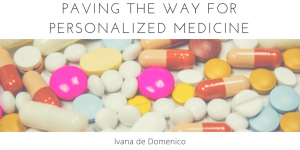When you’re sick or suffering from a medical condition, you go to the doctor and, after a brief evaluation, they’ll most likely diagnose you with something and prescribe you a medication for it- the same medication millions of others have taken. But what if you could take a pill that was tailored for your unique genetic makeup? It sounds like something out of a science fiction movie, doesn’t it? Believe it or not, the day of personalized medicine is not too far away.
According to Genome magazine, medicine as we currently know it “revolves around ‘standards of care,’ the best courses of prevention or treatment for the general population, or the average person on the street.” When you’re sick, you’re treated based on your condition (which many others could share), not your personal case. Doctors take a one-size-fits-all approach.
Now, scientists are looking toward a more personal approach. In the most basic terms, personalized medicine is medicine based on genomic makeup. Even though you may not have heard of the term “personalized medicine” until more recently, it has actually been around for more than 20 years, since scientists first set out to sequence the first human genome. In 2003, the Human Genome Project was successfully completed when scientists mapped the entire human gene sequence. Even if we haven’t seen the results yet, the completion of the Human Genome Project was a milestone in scientific research. Since then, researchers have discovered over 1,800 disease genes and utilized more than 2,000 genetic tests and 350 biotechnology-based products for clinical trials. But none of this progress is an instance of personalized medicine…yet.
Today, patients can have their personal genomes sequenced. Just this ability to chart a person’s individualized genetic makeup is evidence of the potential of targeted treatments to fight diseases and conditions.
The push toward personalized medicine really took off with cancer research, and that is where it has made the most headway. Personalized medicine has already had some success at treating certain forms of cancer, with the Wall Street Journal reporting in 2011 that melanoma, thyroid, colorectal, lung, pancreatic, and breast cancers have had substantial percentages of tumors in patients that could be targeted by personalized drugs. What makes targeted treatments so profound in cancer treatment, as opposed to chemotherapy, is that this form of treatment targets cancer cells rather than destroying all fast-growing cells it comes into contact with.
Several startup companies specializing in artificial intelligence and big data analysis are already paving the way for introducing personalized medicine to the mainstream. For instance, Deep Genomics, founded by researchers at the University of Toronto, is employing artificial intelligence to predict how genetic mutations will change cells and affect the human body. Epinomics, founded by researchers at Stanford University, is sequencing a map of what turns genes on and off so that physicians could use this information to develop personalized treatments. Vitagene, a San Francisco startup, is using DNA to deliver personalized nutrition plans listing what vitamins you should take and in what doses.
As promising as all of these personalized medicine anecdotes are, we are not quite there yet. “While personalized medicine is escalating and becoming more common, it’s still in its infancy, and there are not yet enough products on the market that have penetrated the consciousness of the average patient,” says Edward Abrahams, president of the Washington, D.C.-based Personalized Medicine Coalition. One of the areas where personalized medicine could have huge potential is in treating mental health disorders; several pharmaceutical companies are selling tests to psychologists so that they can select personalized drug treatments for their patients based on DNA mutations and their metabolizing rate. However, scientists concede that they know a lot more about cancer than they do about the brain. “In psychiatry, it’s much harder because we don’t know enough about how the brain works,” said University of Kentucky psychiatry professor, Jose de Leon.
Even though personalized medicine has already made a lot of headway and the technology to take it even further exists, several kinks will need to be worked out before it becomes the norm: flexible payment systems will need to be developed, regulatory guidelines will have to be implemented, medical schools will need to integrate personalized medicine into their curricula, and patients must be on board. Then, when all those things are achieved, personalized medicine will just be medicine.
